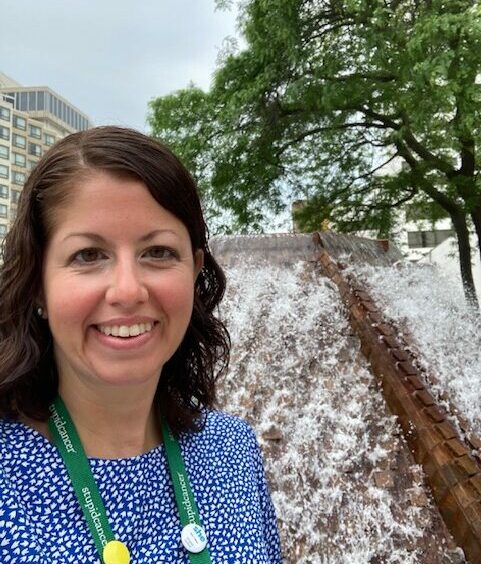I first got involved with Stupid Cancer through my work as an oncology social worker. I support a lot of young adults newly diagnosed and trying to navigate their cancer experience–whether overcoming oncofertility obstacles, insurance challenges while balancing work and treatment, breaking the news of their diagnosis to young children, and anything else that might come up during this difficult time.
Stupid Cancer has also impacted me on a personal level, as I am a thyroid cancer survivor. I joke that I treated myself to a total thyroidectomy for my 30th birthday, but it was also a difficult experience to go through. I did not and still do not feel like a “real” survivor because I spent one night in the hospital for the surgery and now I take hormone replacements everyday and see an endocrinologist twice a year. I (thankfully) did not need chemotherapy, radioactive iodine, or any other strenuous, invasive procedures. I didn’t lose my hair or experience nausea. But what I learned during this year’s CancerCon is the cancer experience is not a competition – no one is more a survivor than anyone else. No one had a better or worse experience – we are all in this together. I was (finally) able to process some of these feelings I might not have even realized I had when I participated in a breakout session on Imposter Syndrome. Before this session, I wasn’t able to label these feelings or work through them. I did not know I felt like an imposter, I just knew I felt like I had a different experience than other survivors.
I remember feeling a lot of guilt when I was first diagnosed. It was the day after Mother’s Day and I sat on that information for at least a week because I didn’t want to disrupt the high we all felt from celebrating the weekend with my family. I didn’t want anyone crying over my health status, because I actually felt hopeful that I would be okay. Some people don’t even feel comfortable with the word “survivor,” because they may still be living with that cancer anxiety, fear or recurrence, or metastatic disease. There may not be an end in sight.
As a survivor, I consider my “cancerversary” to be July 9th, 2014, because that was when I underwent my total thyroidectomy. That was the date I officially became “cancer-free”. There was a bit of an adjustment period after this date, however. There were several months when I felt like a science experiment, because I needed frequent blood work as my endocrinologist calculated my TSH and thyroglobulin levels. I experienced extreme fatigue due to hypothyroidism. I experienced neuropathy due to sharp decreases in my calcium levels. I was allergic to the sutures used and my body rejected my stitches, which then became infected. There was a long adjustment period for me, both physically and mentally.
The biggest lesson I have learned from cancer is it can be incredibly isolating, especially for a young adult. There is this sort of limbo between pediatric and older adult cancer where young adults live. There are not nearly enough resources for this special population, but organizations like Stupid Cancer are helping close this gap. They absolutely do make young adult cancer “suck less.”
By : Lyndsey Griffin

